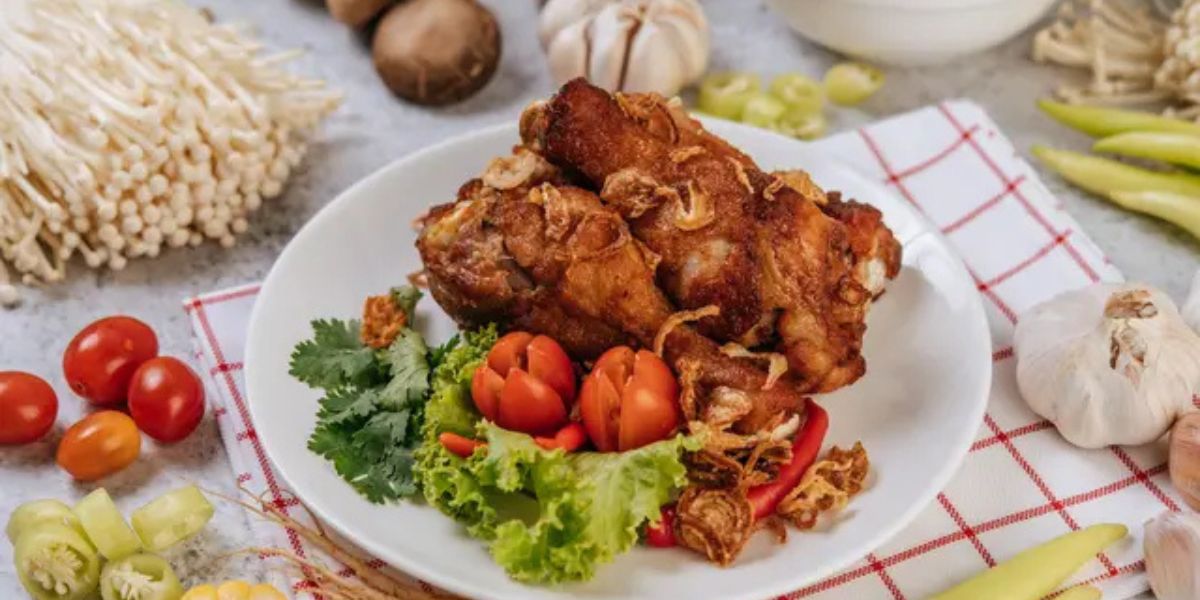Calm Your Soul, Powerful Tips to Overcome Panic While Flying!
Experiencing anxiety while flying? Don't worry! Discover powerful tips to overcome your flight anxiety or aerophobia and enjoy air travel more calmly and comfortably.

Kapanlagi.com - Presenting perfect fried chicken on the table is often a challenge, especially when there are still blood spots visible even after it has been stewed. Many people often feel disappointed with the unsatisfactory final result, as this not only affects the appearance but also the taste and texture of the fried chicken itself.
Various factors can be the cause, ranging from improper cutting techniques, incorrect boiling temperatures, to the condition of the chicken that has not fully softened before cooking.
Summarized by KapanLagi.com from the Instagram account @ummubalqishaura on Tuesday, (18/3/2025), there are several effective tips to address the issue of fried chicken that is still bloody even after stewing. This viral video, which has been watched hundreds of thousands of times, explains that the preparation of the chicken before the frying process greatly affects the final result.
By understanding the causes and applying the right techniques, you can achieve perfectly cooked fried chicken, free from disturbing blood spots. Ready to try? Your dream fried chicken awaits!
Fried chicken that looks tempting can be disappointing if it is still bloody when served. There are several reasons that can cause this.
The proper cutting of chicken is key to obtaining clean and delicious meat, where the technique must be performed carefully. It is advisable to cut at the joints or muscles, not directly on the bones, so that the blood can flow out optimally.
After that, soaking the chicken in brine or lime water for 15-30 minutes is an important step that should not be skipped. This solution will help to remove any residual blood trapped in the meat fibers, resulting in a fresher and more appetizing final product. Be sure to rinse the chicken thoroughly before proceeding to the cooking process, as with the right cutting and soaking techniques, you will minimize the possibility of residual blood in the chicken meat, making it more delicious when served.
Soaking chicken in saltwater or lime juice before stewing is a great trick to achieve more delicious and blood-free meat. The saltwater solution works by drawing blood from the meat fibers, making the chicken juicier, while lime juice effectively eliminates fishy odors and speeds up the cleaning process.
For best results, soaking should ideally be done for at least 30 minutes, but it is more ideal if done for 6 hours in the refrigerator, so that the seasoning can fully penetrate. After soaking, don’t forget to rinse the chicken to remove any leftover salt, and remember, do not soak for too long to avoid the meat becoming too salty. With this technique, you can reduce the likelihood of blood remaining when frying, making your dish even more appetizing!
The stove temperature when stewing chicken plays a significant role in determining the doneness of the meat. If the heat is too low, the chicken may not be fully cooked inside, and when fried, any remaining blood can disrupt the dish's deliciousness.
Therefore, it is important to set the heat correctly to ensure the chicken cooks evenly. Generally, the ideal time for stewing chicken ranges from 30 minutes to 1 hour, depending on the size of the chicken pieces used.

Photo: Instagram/@ummubalqishaura.
The marinating time for chicken is crucial in determining the flavor of the dish! It is recommended to let the chicken soak in the spices longer than usual, so that the spices can penetrate perfectly and the blood is completely released. Make sure every part of the chicken is evenly coated with the spices to achieve the best possible result that is truly appetizing!
Storing chicken in the freezer is indeed practical, but there are several tricks to keep the meat quality intact when cooking. Make sure the chicken is tightly wrapped to avoid exposure to air that can dry out the meat.
When it's time to marinate, don't forget to thaw the chicken properly—either by moving it to the refrigerator overnight or by soaking it in cold water. Avoid thawing chicken at room temperature as it can increase the risk of bacterial growth.
Ensure the chicken is completely tender before marinating so that the spices penetrate perfectly and the meat cooks without leaving any blood. A common mistake is frying chicken that is still partially frozen, which can result in an undercooked interior. So, prepare the chicken properly and enjoy a delicious dish!
Before frying, this simple yet effective technique can be the secret to achieving perfectly fried chicken: just poke the thick parts of the chicken meat with a fork or knife. This method will help release any trapped blood, allowing the chicken to cook evenly without unsightly blood spots.
Also, make sure the oil temperature is around 175-180°C when frying, so the outside of the chicken is crispy without sacrificing the tenderness of the inside. Cooking over low and even heat is the key to getting delicious and perfect results. With these tips, your fried chicken is guaranteed to be mouthwatering!
(kpl/sfh)
Cobain For You Page (FYP) Yang kamu suka ada di sini,
lihat isinya
Experiencing anxiety while flying? Don't worry! Discover powerful tips to overcome your flight anxiety or aerophobia and enjoy air travel more calmly and comfortably.
Javanese Capcay is a delicious dish that combines a variety of fresh vegetables and protein sources, making it the perfect choice for sahur that is not only appetizing but also nutritious.
Here are some recommendations for the best Chinese animated films, each title has an interesting story.
Behind the success of these productions lies an interesting story about actors and actresses who were actually offered leading roles but chose to decline. Here are the stories of Korean stars who "passed up" the opportunity to act in projects that ultimately made history.
Get ready to be emotional! Netflix presents a lineup of the latest Chinese dramas, from high school love stories to thrilling adventures in the snow, all of which you can enjoy now!
Here is a collection of 350 meaningful quotes by Albert Einstein.
Here are 350 romantic Valentine words that you can give to your partner, friends, or family on Valentine's Day.
Here are 350 heartfelt birthday wishes for yourself as a form of appreciation and expression of gratitude.
Let’s learn more about the usage of the interrogative word 'when' and its examples.
Here are 350 words about the sea that can calm the soul and refresh the mind.
Here is a collection of sad quotes about family life that may reflect your feelings right now.
Here is a collection of sad quotes about love that may represent your feelings.